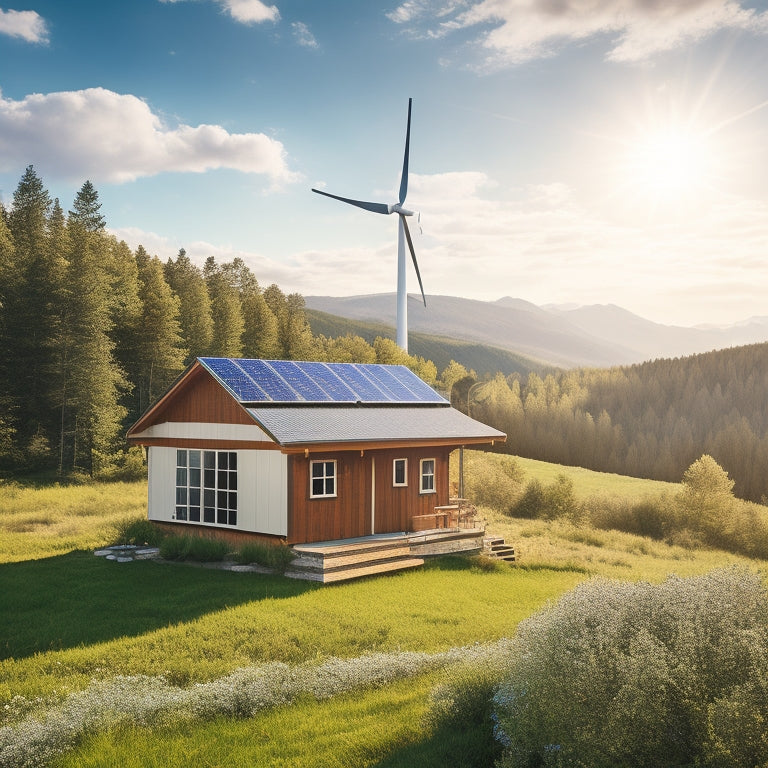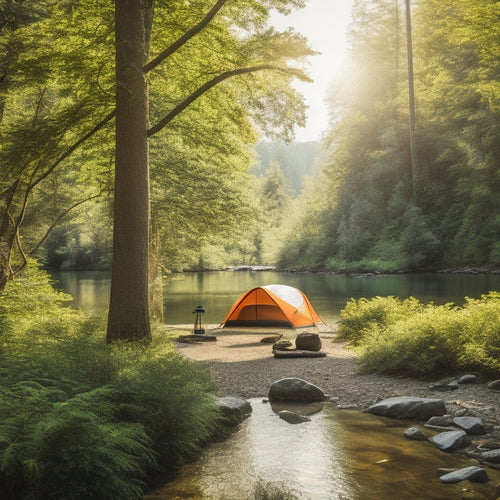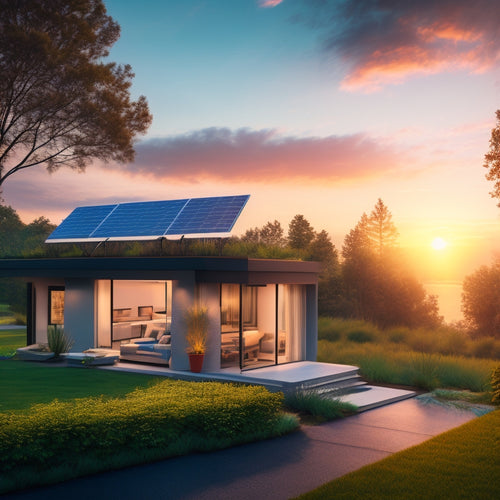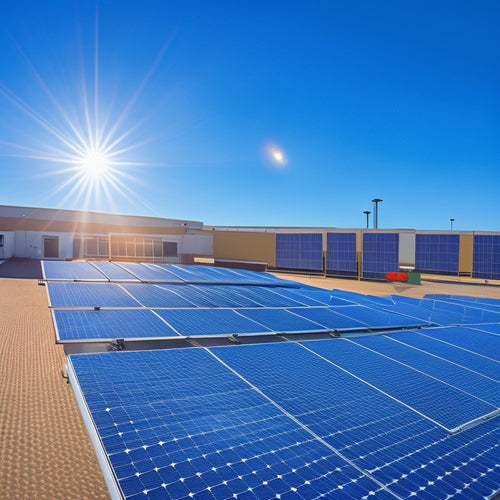
Power Your Cabin With DIY Off-Grid Energy
Share
You're looking to power your cabin with DIY off-grid energy. That's a great step towards energy independence and reducing your carbon footprint. By choosing the right solar panel kit, conducting a thorough cabin energy audit, and selecting the right deep cycle batteries and inverter/charge controller, you'll be well on your way. But that's just the beginning. You'll also need to take into account factors like grid-tie vs off-grid systems, monitoring and maintenance, and energy storage solutions. By mastering these components, you'll be able to harness the full potential of renewable energy and enjoy a more sustainable, autonomous lifestyle - and we're just getting started.
Key Takeaways
• Evaluate your cabin's energy requirements and solar resources to determine the right solar panel kit for your off-grid energy system.
• Conduct an energy audit to identify areas of inefficiency and optimize energy consumption in your cabin.
• Select the right deep cycle batteries and inverter/charge controller for your off-grid system, considering factors beyond upfront cost.
• Monitor and maintain your off-grid system regularly to maximize energy harvest, troubleshoot issues, and extend equipment lifespan.
• Consider alternative renewable energy options like wind, geothermal, biomass, and hydroelectric power to supplement your solar power system.
Benefits of Off-Grid Energy Systems
By shifting to off-grid energy systems, you can greatly decrease your dependence on public utilities and enjoy a multitude of benefits that enhance your lifestyle and the environment.
One of the most significant advantages is Energy Independence, allowing you to generate your own power and reduce your reliance on the grid. This not only saves you money on your utility bills but also provides a sense of security and autonomy.
Off-grid energy systems also promote Environmental Stewardship by reducing your carbon footprint. Renewable energy sources like solar and wind power produce clean energy, minimizing the amount of greenhouse gases released into the atmosphere. This helps combat climate change and preserves natural resources for future generations.
Furthermore, off-grid systems reduce the risk of power outages and grid failures, ensuring a steady supply of energy even in remote areas. By embracing off-grid energy, you're not only investing in your own independence but also contributing to a cleaner, more sustainable future.
Choosing the Right Solar Panel Kit
You'll need to carefully evaluate your energy requirements and assess your site's solar resource to choose the right solar panel kit for your off-grid energy system. This involves calculating your daily energy usage in watt-hours, taking into account factors like appliances, lighting, and heating.
Next, assess your site's solar resource by considering factors like latitude, altitude, and shading. This will help you determine the best panel size and configuration for your cabin.
When selecting a solar panel kit, consider panel efficiency, which affects the amount of energy produced per unit area. Higher-efficiency panels may be more expensive, but they can be a better option for smaller roofs or areas with limited space.
You'll also need to account for seasonal variance, as the sun's angle and intensity change throughout the year. Look for kits with seasonal adjustments or tracking systems to optimize energy production.
Cabin Energy Audit and Assessment
To optimize your off-grid energy system, you need to conduct a thorough cabin energy audit and assessment to identify areas of energy inefficiency and opportunities for improvement. This vital step helps you understand how energy is being consumed in your cabin, and where you can make adjustments to maximize energy efficiency.
Start by examining your cabin's insulation, as poor insulation can lead to significant heat loss and energy waste. Check for gaps and cracks in walls, floors, and ceilings, and consider adding insulation to your attic, walls, and floors.
Next, assess your lighting, appliances, and HVAC systems to identify opportunities for energy-efficient upgrades. Consider replacing incandescent bulbs with LEDs, installing energy-efficient appliances, and upgrading to a high-efficiency HVAC system.
Selecting Deep Cycle Batteries Wisely
When selecting deep cycle batteries for your off-grid energy system, it's important to take into account factors beyond just the upfront cost, as the right choice can greatly impact your system's overall performance and longevity. You'll want to consider the battery's cycle life, which refers to the number of charge and discharge cycles it can handle before its capacity starts to degrade. A higher cycle life means your batteries will last longer and require less frequent replacements.
Another vital factor is Battery Maintenance. Look for batteries with built-in monitoring systems that alert you to any issues, allowing you to take corrective action before they become significant problems. You should also think about the type of maintenance required, such as equalization charging, and whether the batteries are compatible with your system's charging regime.
Inverter and Charge Controller Essentials
With your deep cycle batteries in place, it's time to focus on the components that convert and regulate the energy they store, namely the inverter and charge controller. These two components are vital to your off-grid energy system, as they guarantee that the energy stored in your batteries is converted into usable electricity and recharged safely.
When selecting an inverter, consider its efficiency, as it directly affects the overall performance of your system. Look for an inverter with high efficiency ratings, typically above 90%. This will minimize energy losses and reduce heat generation.
| Component | Function | Key Consideration |
|---|---|---|
| Inverter | Converts DC to AC power | Inverter efficiency (>90%) |
| Charge Controller | Regulates energy flow to batteries | Controller compatibility |
| Battery Monitor | Monitors battery state of charge | Accurate monitoring |
When choosing a charge controller, ensure it's compatible with your battery type and inverter. A compatible controller guarantees safe and efficient charging of your batteries. By selecting the right inverter and charge controller, you'll be able to harness and utilize the energy stored in your deep cycle batteries efficiently and effectively.
DIY Solar Installation Safety Tips
Installing a DIY solar panel system requires careful attention to safety protocols to prevent electrical shocks, fires, and other hazards. You're working with high-voltage electrical systems, and a single mistake can be disastrous.
To guarantee a safe and successful installation, follow these essential safety tips:
-
Wear protective gear: Always wear rubber-soled shoes, gloves, and safety glasses to safeguard yourself from electrical shock and falling objects.
-
Verify electrical connections: Double-check all electrical connections to prevent electrical shock and fires. Confirm all connections are secure, and wires are properly insulated.
-
Weather resistance matters: Ensure your solar panels and mounting systems can endure harsh weather conditions, such as heavy winds and hail. This will prevent damage to your system and reduce the risk of electrical shock.
Grid-Tie Vs Off-Grid Systems Compared
You're likely considering two popular options for harnessing solar energy: grid-tie and off-grid systems, each with its unique benefits and drawbacks.
Grid-tie systems allow you to sell excess energy back to the grid, providing a credit on your utility bill and achieving Grid Parity. This setup is ideal for homes already connected to the grid, as it maximizes energy production and reduces your reliance on the grid. However, it requires a grid connection, and you'll still need to pay for grid services.
Off-grid systems, on the other hand, provide independence from the grid, making them perfect for remote locations or those seeking energy autonomy. These systems require a battery bank to store excess energy, allowing you to access it when needed. This setup offers System Flexibility, as you can add or remove components as needed. Off-grid systems are more complex and typically more expensive, but they provide true energy independence.
When choosing between grid-tie and off-grid systems, consider your energy needs, budget, and location to determine which option best suits your lifestyle.
Monitoring and Maintaining Your System
Your off-grid energy system's performance relies heavily on regular monitoring and maintenance to guarantee maximum energy harvest, troubleshoot potential issues, and extend the lifespan of your equipment.
As you navigate the world of DIY off-grid energy, it's essential to keep a close eye on your system's performance to make sure it's running efficiently.
To optimize your system's performance, you'll need to:
-
Regularly review energy logs to identify patterns and anomalies that may indicate potential issues
-
Perform routine inspections to detect signs of wear and tear on your equipment
-
Update your system's software and firmware to make sure you have the latest features and security patches.
Cost-Effective Off-Grid Energy Solutions
When exploring cost-effective off-grid energy solutions, you'll want to examine renewable energy options that reduce your reliance on fossil fuels.
You'll also need to contemplate energy storage systems that can efficiently store excess energy generated by your renewable sources.
Renewable Energy Options
With the rising demand for sustainable living, renewable energy options have emerged as a cost-effective alternative to traditional off-grid energy solutions. As you explore alternative energy sources, you'll find that renewable energy options offer a cleaner, more efficient way to power your cabin.
When it comes to harnessing renewable energy, you have several options to consider:
-
Wind Turbines: If you live in a windy area, wind turbines can be an effective way to generate electricity. With the cost of wind turbines decreasing, they're becoming a more viable option for off-grid energy.
-
Geothermal Potential: If you live in an area with significant geothermal activity, you can tap into the earth's natural heat to generate electricity. This option is particularly effective in regions with hot springs or volcanic activity.
-
Solar Power: While not always the most efficient option, solar power can be a reliable source of renewable energy, especially in areas with high sunlight exposure.
Energy Storage Systems
How will you guarantee a steady supply of power when the sun sets or the winds die down, and what role do energy storage systems play in providing a cost-effective off-grid energy solution?
Energy storage systems are a vital component of any off-grid energy setup, ensuring a reliable supply of power when your renewable energy sources aren't generating electricity. As you design your off-grid energy system, you'll need to contemplate the type and size of energy storage system that best suits your needs.
When selecting a battery bank, contemplate factors such as depth of discharge, cycle life, and maintenance requirements. Proper Battery Maintenance is essential to extend the lifespan of your batteries and optimize their performance.
Look for energy-efficient solutions that minimize energy losses and maximize your system's overall Energy Efficiency. By integrating an efficient energy storage system into your off-grid setup, you'll be able to harness and store excess energy generated during the day for use during periods of low energy production. This ensures a steady supply of power, even when the sun doesn't shine or the winds die down.
Frequently Asked Questions
Can I Use a Generator as a Backup for My Off-Grid System?
You can use a generator as a backup for your off-grid system, but remember to prioritize Generator Maintenance and Fuel Efficiency to guarantee reliability and minimize environmental impact.
How Often Should I Clean My Solar Panels for Optimal Performance?
Just as a gentle spring rain cleanses the earth, you should clean your solar panels regularly to prevent dust accumulation, ensuring peak panel efficiency, as a 1-2% loss in efficiency can occur with every 0.01 ounces of dust per square foot.
Are Lithium-Ion Batteries Suitable for Off-Grid Energy Systems?
You'll find lithium-ion batteries suitable for off-grid energy systems, but consider Battery Maintenance, as deep discharging can reduce lifespan; aim for a moderate Depth of Discharge to guarantee peak performance and longevity.
Can I Mix and Match Different Brands of Solar Panels and Inverters?
Did you know that 70% of homeowners take into account energy efficiency when purchasing solar panels? When mixing and matching solar panels and inverters, you'll encounter compatibility issues and system integration challenges, so make sure the brands you choose have compatible communication protocols and electrical characteristics.
Will an Off-Grid Energy System Increase My Property's Value?
When you install an off-grid energy system, you'll likely see a boost in your property's resale value, as it adds a unique selling point, increasing appraisal benefits and attracting eco-conscious buyers willing to pay a premium.
Related Posts
-

Top Eco-Friendly Camping Equipment for a Sustainable Adventure
When you're camping with the planet in mind, opt for eco-friendly gear like tents made from recycled materials and bi...
-

The Future of Residential Energy Storage
The future of residential energy storage looks promising and cost-effective for you. With lithium-ion battery prices ...
-

Essential Solar Panel Mounts for Commercial Properties
When it comes to essential solar panel mounts for your commercial property, durability and wind resistance are key fa...


